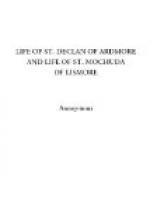Leaving Rahen Mochuda paid a visit to the monastic cemetery weeping as he looked upon it; he blessed those interred there and prayed for them. By the permission of God it happened that the grave of a long deceased monk opened so that all saw it, and, putting his head out of the grave, the tenant of the tomb cried out in a loud voice: “O holy man and servant of God, bless us that through thy blessing we may rise and go with you whither you go.” Mochuda replied:—“So novel a thing I shall not do, for it behoves not to raise so large a number of people before the general resurrection.” The monk asked—“Why then father, do you leave us, though we have promised union with you in one place for ever?” Mochuda answered:—“Brother, have you ever heard the proverb—’necessitas movet decretum et consilium’ (necessity is its own law)? Remain ye therefore in your resting places and on the day of general resurrection I shall come with all my brethren and we shall all assemble before the great cross called ‘Cross of the Angels’ at the church door and go together for judgement.” When Mochuda had finished, the monk lay back in his grave and the coffin closed.
Mochuda, with his following, next visited the cross already mentioned and here, turning to the king, he thus addressed him:—“Behold the heavens above you and the earth below.” The king looked at them: then Mochuda continued:—“Heaven may you not possess and even from your earthly principality may you soon be driven and your brother whom you have reproached, because he would not lay hands on me, shall possess it instead of you, and in your lifetime. You shall be despised by all—so much so that in your brother’s house they shall forget to supply you with food. Moreover yourself and your children shall come to an evil end and in a little while there shall not be one of your seed remaining.” Then Mochuda cursed him and he rang his small bell against him and against his race, whence the bell has since been known as “The Bell of Blathmac’s Extinguishing,” or “The Bell of Blathmac’s Drowning,” because it drowned or extinguished Blathmac with his posterity. Blathmac had a large family of sons and daughters but, owing to Mochuda’s curse, their race became extinct. Next to the prince of Cluain Earaird who also had seized him by the hand, he said: “You shall be a servant and a bondman ere you die and you shall lose your territory and your race will be a servile one.” To another of those who led him by the hand he said:—“What moved you to drag me by the hand from my own monastery?” The other replied:—“It pleased me not that a Munster man should have such honour in Meath.” “I wish,” said Mochuda, “that the hand you laid on me may be accursed and that the face you turned against me to expel me from my home may be repulsive and scrofulous for the remainder of your life.” This curse was effective for the man’s eye was thereupon destroyed in his head. Mochuda noticed that some of Columcille’s successors and people from Durrow, which was one of Columcille’s foundations, had taken part in his eviction. He thus addressed them:—“Contention and quarrelling shall be yours for ever to work evil and schism amongst you—for you have had a prominent part in exciting opposition to me.” And so it fell out.




